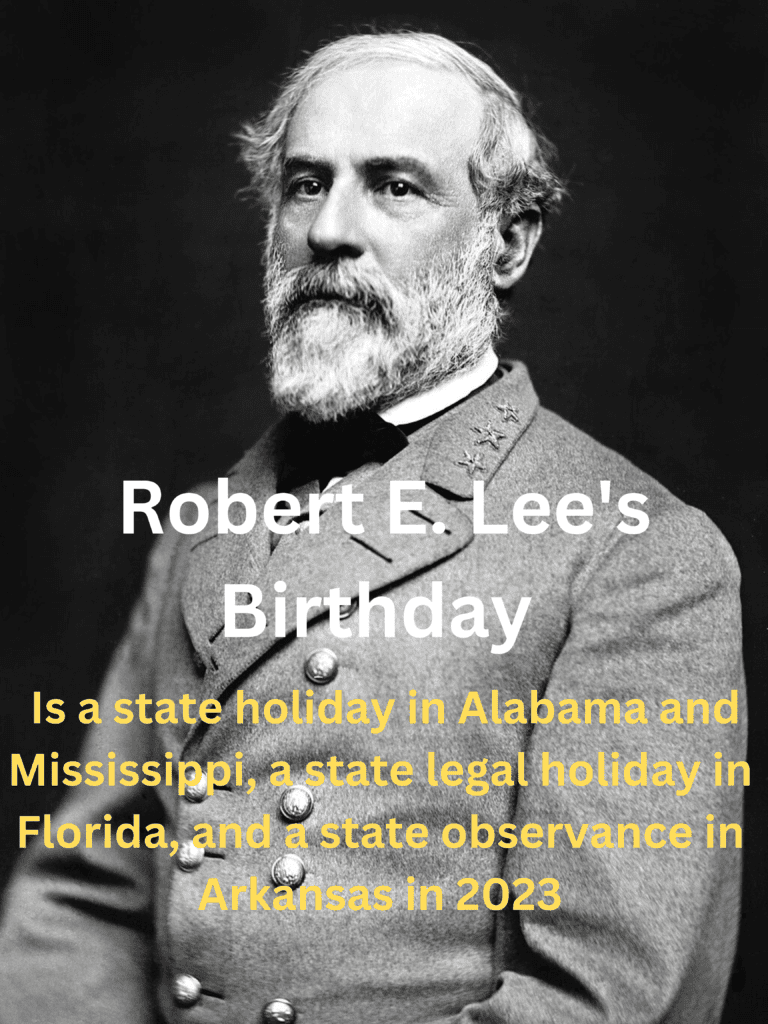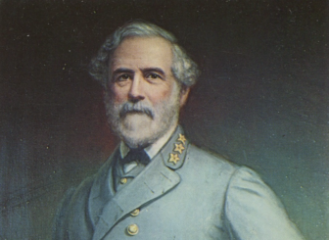Remembering Robert E. Lee: A Complex Legacy on His Birthday
Robert E. Lee’s Birthday is celebrated on either the third Monday of January or January 19, which is his actual birthday. A Confederate general during the American Civil War, Lee is both adored and despised for his part in the conflict and his standing as a Confederate emblem.
Lee was born in Stratford, Virginia, on January 19, 1807. He graduated from West Point and spent nearly 30 years in the United States Army and later chose to be General of the Confederate Army. He was a well recognized officer who fought in the American Civil War.
While Lee’s birthday is observed by some in the United States, it is a day that sparks reflection on a complex legacy and the enduring debate surrounding his role in the American story.
In Year 2023, Robert E. Lee's Birthday is on 19 Jan, Thursday. A State Legal Holiday is in Florida. Robert E. Lee's Day is on 14 Oct, Saturday. State Observance is in Arkansas.
Early Life and Military Career
Robert E. Lee was born into a prominent Virginia family in Stratford Hall, Virginia(Read about another Hero form Virginia) . He graduated first in his class from the United States Military Academy at West Point and later served with distinction in the United States Army, most notably during the Mexican-American War. Lee’s military abilities were well recognized, earning him a stellar reputation inside the United States Army.

Civil War and the Confederacy
The outbreak of the Civil War in 1861 placed Lee at a crossroads. He faced a difficult decision to either remain loyal to the Union or follow his home state of Virginia, which had seceded from the Union. Ultimately, Lee chose to resign his commission in the U.S. Army and side with the Confederacy. He became the General-in-Chief of the Confederate Army and a central figure in the South’s fight for secession.
Lee’s military leadership was marked by several high-profile successes, earning him the admiration of many in the South. He is perhaps best known for his victories at the Battle of Fredericksburg, the Battle of Chancellorsville, and the Battle of Second Manassas. However, he is also associated with the failed invasion of the North that culminated in the Battle of Gettysburg, which proved to be a turning point in the Civil War.
A Complex Legacy of controversy
Robert E. Lee’s legacy is deeply polarized. For some, he is seen as a brilliant military strategist who fought for his homeland and the principles he believed in. Others, however, view him as a symbol of the Confederacy and the institution of slavery, which the Confederacy defended. The debate over how to remember Lee and his actions during the Civil War continues to be a source of controversy.
Lee Was Opposed To Secession
Robert E. Lee is so associated with the South and the Confederacy that many people today don’t know he vehemently opposed secession. The son of a Revolutionary War hero who grew up near the nation’s capital and married into the original first family of the United States, Lee was American through and through. But like some people from Virginian, then and now, Lee self-identified as a Virginian more than anything else.
He waited anxiously in early 1861, hoping that his home state would remain with the Union. However, Virginia seceded in April of that year, and, after being offered command of either army, for the sake of Virginia, he went with the South.
In a letter he wrote on January 23, 1861, Lee expressed his thoughts on the matter:
As an American citizen, I take great pride in my country, her prosperity and her institutions, and would defend any State if her rights were invaded. But I can anticipate no greater calamity for the country than the dissolution of the Union. It would be an accumulation of all the evils we complain of, and I am willing to sacrifice everything but honor for its preservation. I hope, therefore, that all constitutional means will be exhausted before there is a resort to force. Secession is nothing but revolution.
Lee Chose the Right Path
Lee was a patriotic general and a cool-headed individual. He made the noble decision to give up when his side was defeated in order to save his people more suffering in a pointless conflict. He had the option to take a more drastic tack and lead his soldiers into the woods to battle the Americans in a guerrilla fashion. The Union might have continued to fight town after town for ten more years until Lee reappeared and reengaged them. This was originally suggested by Lee’s chief of artillery, and Lee prudently turned it down.
It would have been a nightmare. The United States could not have “lost” the war, and I doubt they could have ever won it. Up until the government raised its hands, everything would have been disastrous. In light of this, Lee’s feeling of honor “I’ve been defeated. In his opinion, it would be better for everyone if he gave up politely. This kept the United States out of a dire situation where the conflict would have persisted and perhaps resulted in endless carnage.
And personally he seemed to genuinely love his troops and the men who served under him loved him back. So in an intimate way he was generous, kind, protective of the men under his command which could be chalked up to a courtly sense of honor in the way a general is to behave.
Post-Civil War Life
After the Civil War, Robert E. Lee dedicated himself to the cause of reconciliation and healing in the United States. He urged fellow Southerners to lay down their arms and work toward rebuilding the nation.
After the four years of the war’s death and destruction, Robert E. Lee met Ulysses S. Grant at Appomattox, Virginia, where the generals ended their battles. Lee told his comrades, “Go home and be good Americans.”
Robert E. Lee’s post-war life as the president of Washington College (now Washington and Lee University) in Lexington, Virginia, demonstrated his dedication to both education and unity. He assumed the role of president in 1865, and the school was later renamed as ‘Washington and Lee University’ to incorporate his name in recognition of his contributions.
As we celebrate Robert E. Lee’s birthday, it’s important to recognize the complexity of his legacy. Lee was a man of his time, shaped by the circumstances and values of 19th-century America. His role in the Civil War and the Confederate cause continues to be a subject of debate, making him a symbol of the ongoing struggle to understand and reconcile the darker chapters of American history. Regardless of one’s perspective on Lee, his life and actions serve as a reminder of the enduring questions surrounding the American Civil War and the ongoing pursuit of a more perfect union.
He died of a heart attack at Washington-Lee College on October 12, 1870, and he is buried in a chapel on the school grounds with his family.





